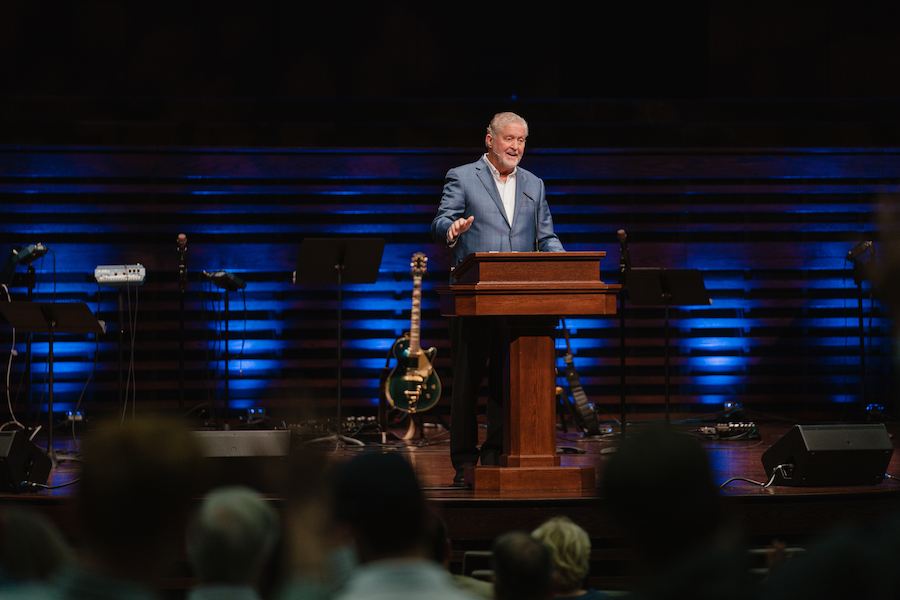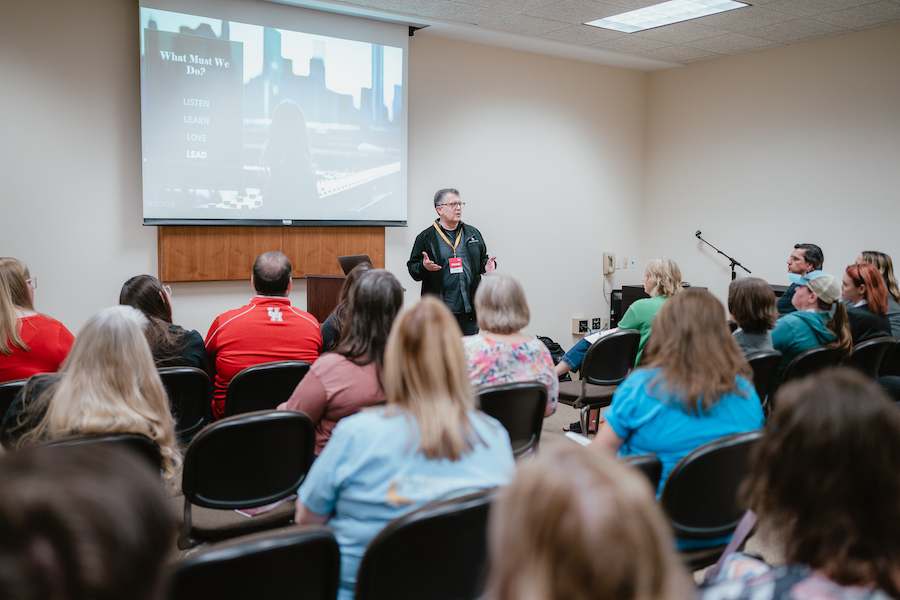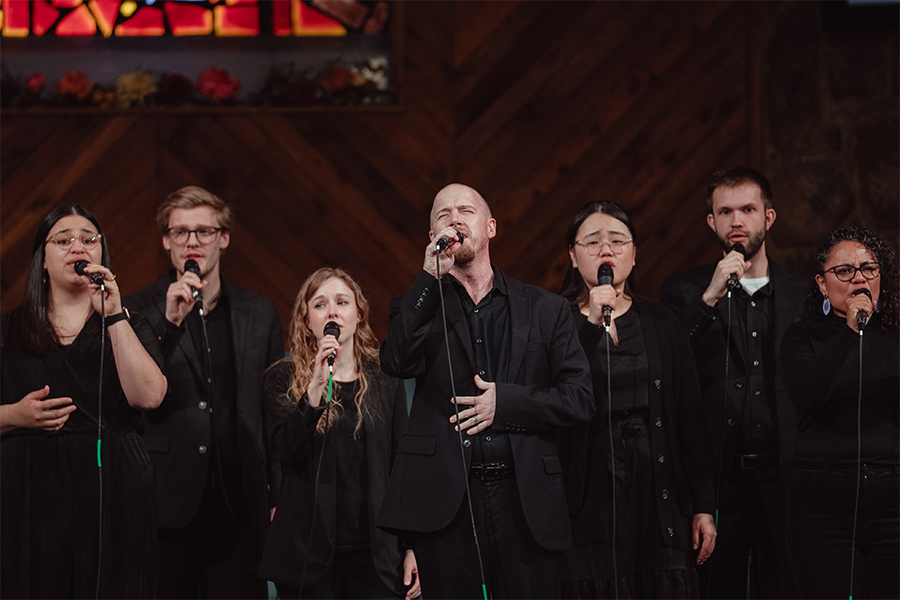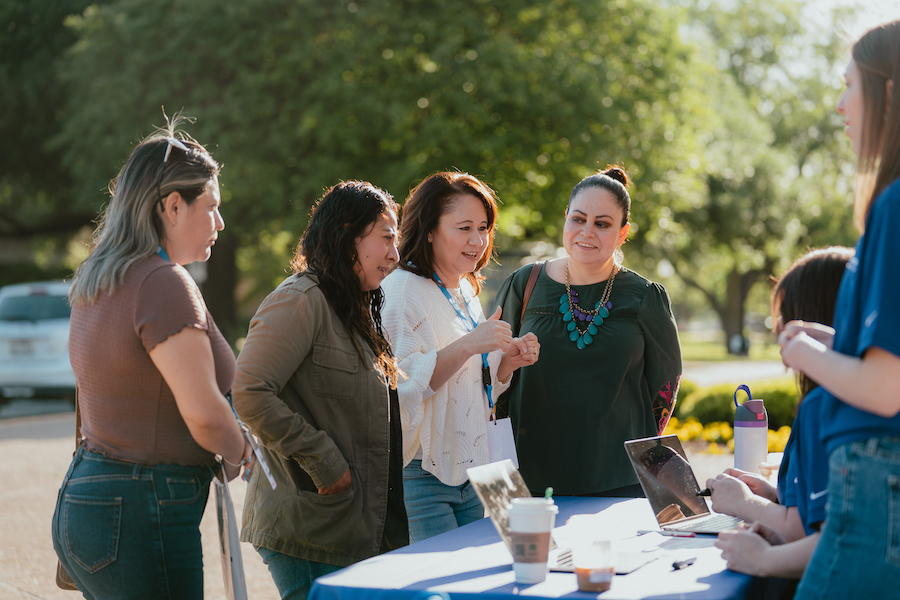‘Go build it. Go start it.’ How the salvation of a suicidal woman confirmed a Southwestern couple’s calling to plant a Utah church
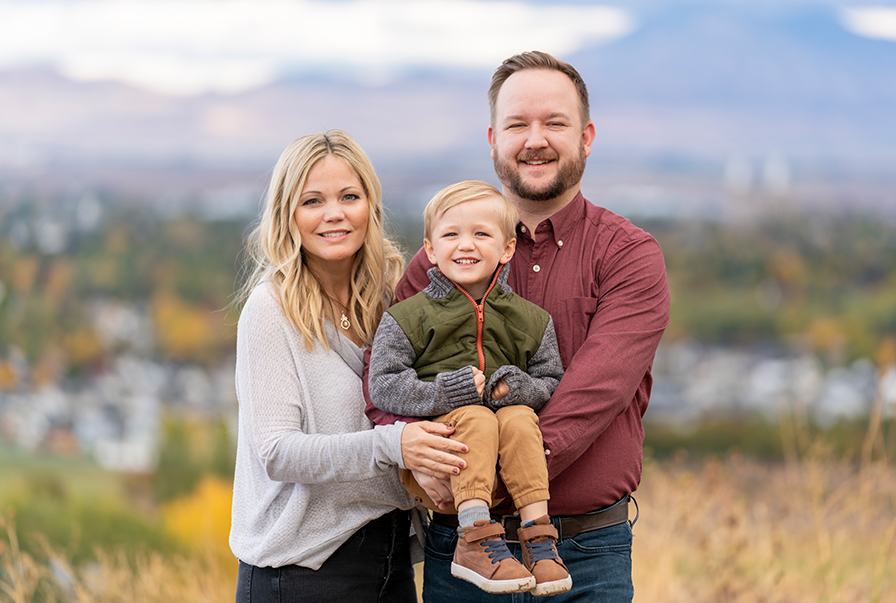

Editor’s Note: The following feature story originally appeared in the fall 2020 issue of Southwestern News.
“Go build it.” Seth and Beth Tarver did a double take when they saw these simple words on a billboard along the Trinity Trail in Fort Worth, Texas, in 2017. They had recently returned from a vision trip to Salt Lake City, Utah, where God confirmed to them for the first time in either of their lives that He had called them to church planting. But little time passed before doubts crept in.
“I’ve never built anything,” Seth recalls thinking. “I can’t build anything.”
A mentor encouraged the couple to ask for signs, so the Tarvers had done so. And during their routine morning walk, they found a message, they believed, from the Lord, printed explicitly on a billboard: “Go build it.”
“Well, building is one thing,” Seth continued apprehensively as he and his wife kept walking. “But I wouldn’t even know where to start. How would we start?”
Within two miles, the Tarvers stood before a second billboard, this one displaying a different but equally pertinent message: “Go start it.”
God’s message was clear, Seth says: “Don’t worry about it. Go build it. Go start it.”
The Tarvers had already decided to go, but now God had quashed any doubts that could have changed their minds. The Tarvers would be uprooting their lives from Fort Worth, Texas, and moving to Logan, Utah, to plant a church.
Over the next three years, the Tarvers built and started a multi-tiered, prayer-filled, Gospel-focused ministry in a place where there had never been a Christian church. Even when the COVID-19 pandemic restricted some of these efforts, God continued to provide opportunities for ministry, and in late August of 2020, the couple witnessed their first-ever salvation on the field when a young woman on the verge of taking her own life encountered Jesus.
Seth credits these opportunities and blessings to God’s answering the prayers of His people—specifically, those who have come alongside the Tarvers in a commitment to pray for their ministry.
“The fact that we have our first salvation in year two versus waiting for year four or five to roll around, to us, is a reflection of when God’s people meet Him in His will and ask for Him to move according to His will. He moves mountains for His Kingdom,” Seth says. “We are floored that we have seen the Lord meet this young woman and transform her life.”
The genesis for the Tarvers’ ministry traces back to West Conroe Baptist Church, a mission-minded congregation in Conroe, Texas. Seth grew up in the church, and it licensed and ordained him for ministry. When West Conroe leadership felt called to plant a church in the predominantly Mormon state of Utah, one potential church planter came to mind: Seth Tarver. Despite some initial hesitations, within a few years, Seth and his wife, Beth, were “boots on the ground” in Logan, Utah, planting the first-ever Christian church in the area.
Jay Gross, senior pastor of West Conroe Baptist Church, which continues to support the Tarvers, says, “I have absolute confidence in Seth’s integrity, his heart for the Lord, and he has got a blazing passion now for planting a church in Utah.”
The couple’s preparation for the field included Seth’s serving on staff at West Conroe for a year while going through the North American Mission Board’s vetting and equipping process. Seth also continued his Master of Divinity studies at Southwestern Baptist Theological Seminary.
Reflecting on his ongoing seminary studies, Seth says, “Probably the biggest treasure cove from Southwestern was talking to the men and women who serve and who are in the roles of leadership there at the seminary, … and just learning from them the balance of a healthy work, family, and life of study.”
The Tarvers were deployed to Logan, Utah, with partners Brian and Leslie Swiney and Stephen and Emily Eenigenburg in the summer of 2018, and together, they planted Riverwoods Fellowship, with Seth serving as the lead pastor. Within two years of arriving on the field, the team had begun hosting a Bible study, a men’s group, a women’s Bible study, a church prayer night, and a Fellowship of Christian Athletes (FCA) ministry at nearby Utah State University.
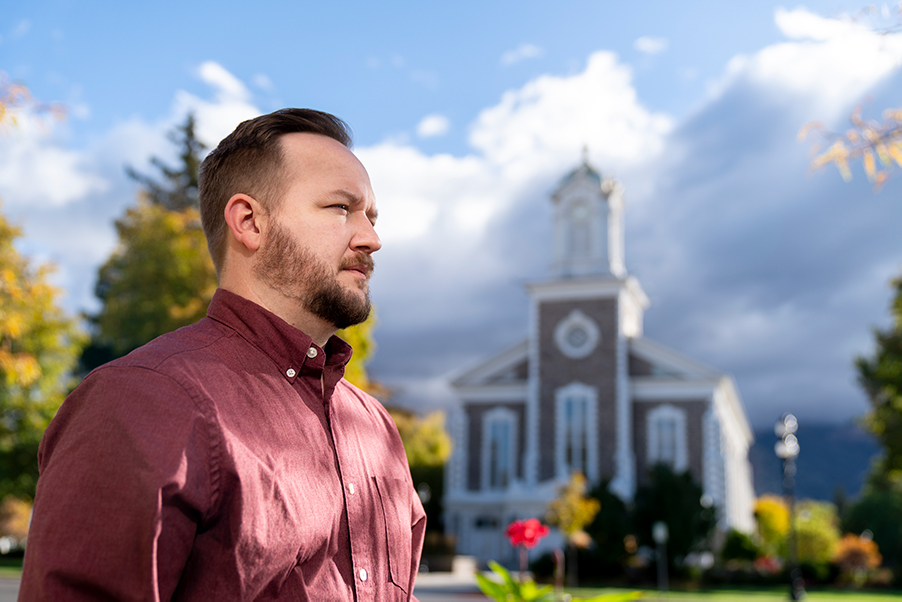
Seth also began working at Utah State, allowing him to utilize lunch breaks to converse with co-workers about spiritual matters. In addition, Beth has begun relationships with other women in the community via playdates for their children, meeting other moms at the park, and offering to babysit others’ children.
Though the coronavirus pandemic has hindered some of these efforts, the Tarvers note that the majority of their ministries have been unaffected. FCA meetings moved online when students returned home halfway through the spring 2020 semester, but the Tarvers continued meeting with friends and neighbors in person. Furthermore, because their Bible study comprises fewer than 20 people, they were able to continue meeting every week—albeit with masks and socially distanced seating.
Through all of these efforts, the church planting team has “watched cold hearts melt.” People from Mormon and agnostic backgrounds have begun to ask questions about what the Tarvers believe and why, and this has opened doors to many spiritual conversations.
Seth meets regularly with a Mormon man, for example, and one day earlier this year, the man began asking questions about theology. This eventually led to him asking Seth, “Do you believe that if I die right now, I would to go to hell?”
Seth gently and lovingly replied, “Yes, and let me explain why.” Seth noted the clear differences between Mormonism and Christianity as defined in Scripture, and then explained the biblical way of salvation. Seth invited the man to respond, and though he declined to do so, he did request future meetings to discuss these matters further.
Seth also plays golf regularly with an agnostic man, who has facetiously noted that Seth tends to play better when he is talking about the Gospel. On a recent outing, the man joked, “You should start talking about Jesus on the first hole.” Humor aside, the man has been asking questions, Seth says, and he apparently desires to know more.
In light of conversations like these, Seth says his ministry in Utah has “been long and hard, but people are starting to warm up, and they’re starting to have those conversations with us that dive deeper than just the surface pleasantries.”
Noting how encouraging this is, Beth adds, “To be able to share with people our testimony and see those lights go off with these friends—the boldness in my heart has grown leaps and bounds.”
In addition to investing in non-Christian families, the Tarvers have also had the opportunity to disciple families in their church. One couple, before joining, had specifically told them, “We’re looking to grow further in our faith, and we’d like the opportunity to attend the Bible study that you offer.”
“We’ve been pouring into this family ever since they started coming to our Bible study,” Seth says. “And what we’ve seen is, they have become more evangelistic.”
In fact, this past August, the wife in this family met a woman who lives close to the church and invited her to the Bible study. Though the woman declined, the two still spoke for a few minutes, and the woman shared that she was experiencing difficulties. This woman would later reveal that she had intended to take her own life, but that the wife’s encouragement “basically got me an extra week.”
Unfortunately, the following week, the woman became discouraged again, and she resumed her plan to commit suicide. But then the wife knocked on her door, this time accompanied by Seth. Seth quickly realized the woman “was not in a good place,” so while he did invite her to the Bible study, he made clear to her that he primarily wanted to speak with her, hear about what she was dealing with, and pray for her.
As this woman would later share, she did not think anyone from the church would come to see her after the wife’s initial contact, but when she and Seth arrived the following week, the woman decided to delay her suicide just long enough to hear them out. After speaking with her for half an hour, Seth “felt like the Lord opened up a window to share the Gospel with her, and so I did. And she ended up getting saved.”
Though the Tarvers had been told during their training as church planters that they would likely not see a salvation decision for five to seven years, they rejoiced that this woman came to saving faith in just their second year on the field.
Seth notes that this came about largely because of the wife’s investment. “This was the fruit of this family growing in their faith over the four or five months and becoming more comfortable with engaging people with the Gospel,” he says.
Seth adds that this is a major focus of Riverwoods Fellowship—specifically, encouraging church members to begin praying on day one for how God is going to use them, and where He is going to send them.
“We constantly have to be going,” Seth explains. “I think that’s why you see that at the beginning of the Great Commission, this idea of go, go, go, because people are not going to come, come, come. They need to be chased after. They need to be sought after. If we hunker down in one place, we’re never going to reach those. So, we need to constantly have a heart and mindset of sending people to go get people, to go after people.”
Though progress has been slow, thanks to God’s answering the prayers of His people, and thanks to the Tarvers’ obedience to “go build” a ministry in Utah, they rejoice at the fruit they have witnessed, even amidst COVID-19.
With the joy of witnessing their first salvation still fresh on their hearts, Seth reflects of this unique season, “It’s not exactly what we were picturing this summer to look like, but it’s been a very rewarding summer for us.”
—
What Does Confirmation of Call Look Like? This.
While considering the prospect of planting a church in Utah, Seth and Beth Tarver met with Travis S. Kerns, then the Send City missionary to Salt Lake City and lead missiologist for the region.
As Kerns explains, whenever he speaks with potential church planters, he does not try to talk them into coming, but to talk them out of it.
“If you come to Utah because you feel like you want to plant there, and you feel God’s calling you … if I can talk you out of that, God’s not calling you there,” explains Kerns, who now serves as associate professor of apologetics and world religions at Southwestern Seminary.
Kerns confronted the Tarvers with “everything negative” they could potentially face on the field, including marital and financial stress, family and health issues, and the slow pace of ministry in the area. On this lattermost point, the Tarvers later learned that church planters in the region typically wait five to seven years before seeing their first salvation.
Beth notes that Kerns “did a really good job” of communicating how difficult the ministry would be. At the time, Beth was pregnant with their son, Grayson, and that night in their hotel, the Tarvers struggled in particular with the challenges of raising a Christian family in that area.
Beth recalls their thinking, “Our hearts break for the people here. We want the Gospel to be shared here. But I don’t think we’re the ones who are called here.”
The next day, Kerns brought them to his church and introduced them to the congregation, noting that they were praying about church planting there. The pastor shook Beth’s hand and said, “God brought us here 30 years ago. I have raised five Christian kids here. All of them have married Christians and are raising godly families. If God calls you here, He will take care of your family.”
Beth immediately broke into tears. Seth explains, “This man literally looked at my wife, and he pretty much addressed almost verbatim, word by word, things that we had prayed the night before.”
After that, Beth says, the couple received “confirmation after confirmation” of God’s calling on their lives, including two providentially placed billboards in Fort Worth. Trusting in the Holy Spirit to do His work through them, the Tarvers accepted the call to plant a church in Utah.
Kerns’ encouragement to the Tarvers, as well as to all church planters, is to “lean back on the calling to this place to do this thing, and lean back on the fact that it’s not up to you. Our only responsibility is to share the Gospel and disciple people. Otherwise, the Holy Spirit does the work.”

